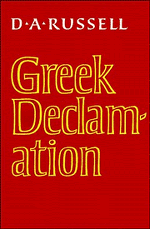6 - Declamation and history
Published online by Cambridge University Press: 07 October 2011
Summary
Concessum est rhetoribus ementiri in historiis ut aliquid dicere possint argutius.
‘Rhetors are allowed to tell lies in their history, so as to be in a position to say something more pointed.’
CiceroWe saw that the imaginary themes (plasmata) of the declaimers are set vaguely in the classical past. Sometimes the mere addition of names turns them into a sort of rudimentary historical fiction. Often, however, the effort of historical imagination is more profound. There is here a distinct difference between Latin practice and Greek. In the Latin schools, historical pieces were usually suasoriae, and so thought easier and less important than the forensic controversiae; but at the same time there seems to have been a greater readiness to adopt themes of contemporary or recent history. In Greek, historical themes are used both for deliberative and for forensic exercises, but they are almost entirely confined to the classical past.
The use of such themes goes back to the beginnings of rhetoric. Gorgias' Helen and Palamedes are relevant, for the difference between the mythical and the historical past is not significant. One of the earliest pieces of evidence we have – a Berlin papyrus of the third century b.c. – is an imaginary defence of the four ‘advocates’ attacked in the last part of Demosthenes' speech against Leptines; similar topics were in use in the schools of the Empire too, for Aristides, Apsines and Lollianus all used the Leptines story.
In all, we know of about 350 themes of Greek history treated by the declaimers.
- Type
- Chapter
- Information
- Greek Declamation , pp. 106 - 128Publisher: Cambridge University PressPrint publication year: 1983



